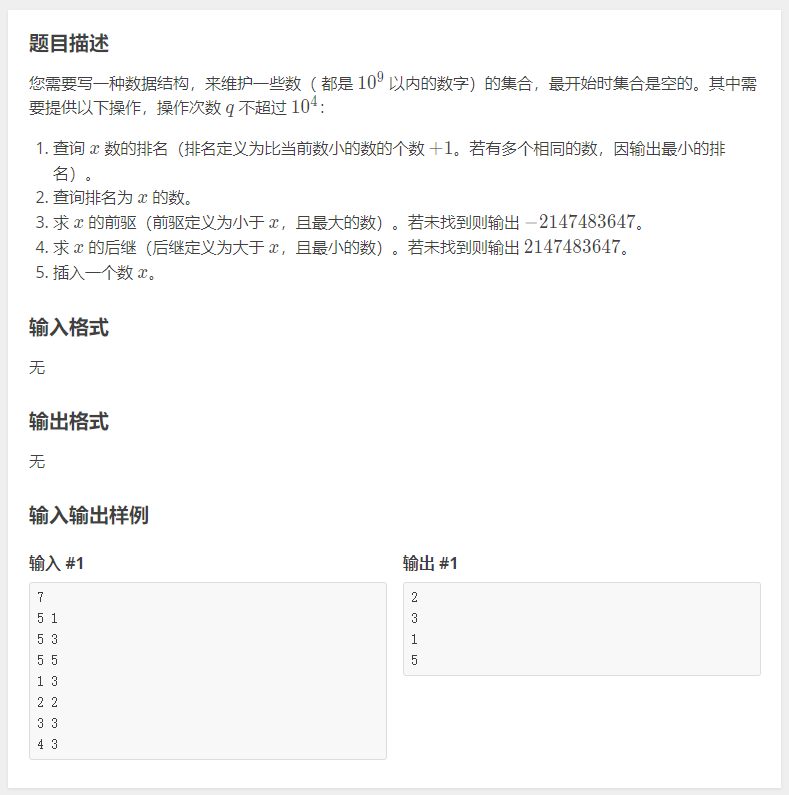1
2
3
4
5
6
7
8
9
10
11
12
13
14
15
16
17
18
19
20
21
22
23
24
25
26
27
28
29
30
31
32
33
34
35
36
37
38
39
40
41
42
43
44
45
46
47
48
49
50
51
52
53
54
55
56
57
58
59
60
61
62
63
64
65
66
67
68
69
70
71
72
73
74
75
76
77
78
79
80
81
82
83
84
85
86
87
88
89
90
91
92
93
94
95
96
97
98
99
100
101
102
103
104
105
106
107
108
109
110
111
112
113
114
115
116
117
118
119
120
121
122
123
124
125
126
127
128
129
130
131
132
133
134
135
136
137
| #include<bits/stdc++.h>
using namespace std;
const int maxn=1e5+5;
int n,m;
struct Node
{
int l,r,sum;
int val,cnt;
}ltt[maxn];
int lst=0,root;
#define ls(x) ltt[x].l
#define rs(x) ltt[x].r
void up(Node &f,Node ls,Node rs)
{
f.sum=f.cnt+ls.sum+rs.sum;
}
void insert(int &p,int x)
{
if(!p)
{
p=++lst;
ltt[p].val=x; ltt[p].cnt=1; ltt[p].sum=1;
return;
}
if(ltt[p].val==x)
{
ltt[p].cnt++; ltt[p].sum++;
return;
}
if(ltt[p].val<x)
{
insert(rs(p),x);
}
else
{
insert(ls(p),x);
}
up(ltt[p],ltt[ls(p)],ltt[rs(p)]);
}
int findth(int p,int x)
{
if(!p) return 1;
int cc=ltt[ls(p)].sum;
if(ltt[p].val==x)
{
return cc+1;
}
if(ltt[p].val>x)
{
return findth(ls(p),x);
}
else
{
return findth(rs(p),x)+cc+ltt[p].cnt;
}
}
int findkth(int p,int k)
{
if(!p) return p;
int cc=ltt[ls(p)].sum;
if(cc>=k) return findkth(ls(p),k);
else if(cc<k && cc+ltt[p].cnt>=k) return p;
else return findkth(rs(p),k-cc-ltt[p].cnt);
}
int pre(int p,int x,int ans)
{
if(!p) return ans;
if(ltt[p].val>=x)
{
return pre(ls(p),x,ans);
}
else
{
return pre(rs(p),x,max(ans,ltt[p].val));
}
}
int nxt(int p,int x,int ans)
{
if(!p) return ans;
if(ltt[p].val<=x)
{
return nxt(rs(p),x,ans);
}
else
{
return nxt(ls(p),x,min(ans,ltt[p].val));
}
}
int main()
{
insert(root,-0x7fffffff);
insert(root,0x7fffffff);
cin>>n;
for(int i=1,a,b;i<=n;i++)
{
cin>>a>>b;
if(a==1)
{
cout<<findth(root,b)-1<<endl;
}
else if(a==2)
{
cout<<ltt[findkth(root,b+1)].val<<endl;
}
else if(a==3)
{
int ans=pre(root,b,-0x7fffffff);
cout<<ans<<endl;
}
else if(a==4)
{
int ans=nxt(root,b,0x7fffffff);
cout<<ans<<endl;
}
else if(a==5)
{
insert(root,b);
}
}
return 0;
}
|

